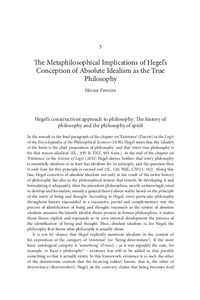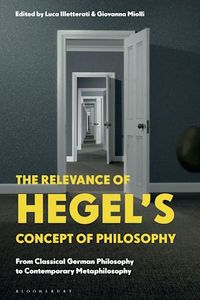Por favor, use este identificador para citar o enlazar este ítem:
https://repositorio.uca.edu.ar/handle/123456789/13910| Título: | The metaphilosophical implications of Hegel’s conception of absolute idealism as the true philosophy | Autor: | Ferreiro, Héctor Alberto | Palabras clave: | Hegel, Georg Wilhelm Friedrich, 1770-1831; FILOSOFIA ALEMANA; ABSOLUTO; IDEALISMO ALEMAN | Fecha de publicación: | 2022 | Editorial: | Bloomsbury Academic | Cita: | Ferreiro, H. A. The metaphilosophical implications of Hegel’s conception of absolute idealism as the true philosophy [en línea]. En: Illetterati, L., Miolli, G. (eds.). The relevance of Hegel’s concept of philosophy : from classical German philosophy to contemporary metaphilosophy. London ; New York : Bloomsbury Academic, 2022. Disponible en: https://repositorio.uca.edu.ar/handle/123456789/13910 | Resumen: | In the remark to the final paragraph of the chapter on ‘Existence’ (Dasein) in the Logic of the Encyclopaedia of the Philosophical Sciences (1830), Hegel states that the ‘ideality of the finite is the chief proposition of philosophy’ and that ‘every true philosophy is for that reason idealism’ (EL,1 §95 R; ENZ, §95 Anm.). At the end of the chapter on ‘Existence’ in the Science of Logic (1832) Hegel claims, further, that ‘every philosophy is essentially idealism or at least has idealism for its principle, and the question then is only how far this principle is carried out’ (SL, 124; WdL, GW21, 142). Along this line, Hegel conceives of absolute idealism not only as the result of the entire history of philosophy but also as the philosophical system that reveals, by developing it and formulating it adequately, what the precedent philosophies, mostly unknowingly, tried to develop and formulate, namely a general theory about reality based on the principle of the unity of being and thought. According to Hegel, every particular philosophy throughout history expounded in a successive, partial and complementary way the process of identification of being and thought; inasmuch as the system of absolute idealism assumes the latently idealist theses present in former philosophies, it makes those theses explicit and expounds as its own internal development the process of the identification of being and thought. Thus, absolute idealism is, for Hegel, the philosophy that shows what philosophy is actually about. It is not by chance that Hegel explicitly mentions idealism in the context of his exposition of the category of ‘existence’ (or ‘being-determinate’). If the most basic ontological category is ‘something’ (Etwas) – as it was arguably the case, for example, in Kant´s philosophy2 – existence has still to be added to that possible something so that it actually exists. In this framework, existence is as such the other of the determinate content that the knowing subject knows, that is, the other of determinacy (Bestimmtheit). Hegel, on the contrary, claims that being becomes itself being-determinate and, further, the existing determinate thing (Daseiendes) (EL §90; ENZ §90; SL, 88–90; WdL, GW21, 102–103; see also WdL, GW11, 65–66)... | URI: | https://repositorio.uca.edu.ar/handle/123456789/13910 | ISBN: | 9781350162600 | Disciplina: | FILOSOFIA | Derechos: | Acceso abierto | Fuente: | Illetterati, L., Miolli, G. (eds.). The relevance of Hegel’s concept of philosophy : from classical German philosophy to contemporary metaphilosophy. London ; New York : Bloomsbury Academic, 2022. |
| Aparece en las colecciones: | Libros/partes de libro |
Ficheros en este ítem:
| Fichero | Descripción | Tamaño | Formato | |
|---|---|---|---|---|
| metaphilosophical-implications-hegel.pdf | 543,65 kB | Adobe PDF |  Visualizar/Abrir | |
| portada.jpg | 41,23 kB | JPEG |  Visualizar/Abrir |
Visualizaciones de página(s)
80
comprobado en 27-abr-2024
Descarga(s)
68
comprobado en 27-abr-2024
Google ScholarTM
Ver en Google Scholar
Altmetric
Este ítem está sujeto a una Licencia Creative Commons

